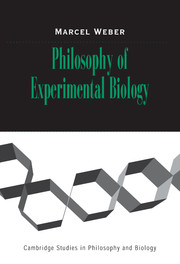Book contents
- Frontmatter
- Contents
- Preface
- Acknowledgements
- 1 Introduction
- 2 Reductionism and the Nature of Explanations
- 3 Discovery: Solving Biological Problems
- 4 Scientific Inference: Testing Hypotheses
- 5 Experimental Systems: A Life of Their Own?
- 6 Model Organisms: Of Flies and Elephants
- 7 Reference and Conceptual Change: Out of Mendel's Garden?
- 8 Developmental Biology and the Genetic Program: Explaining Ontogeny
- 9 Scientific Realism: In Search of the Truth
- Notes
- Bibliography
- Index
8 - Developmental Biology and the Genetic Program: Explaining Ontogeny
Published online by Cambridge University Press: 08 July 2009
- Frontmatter
- Contents
- Preface
- Acknowledgements
- 1 Introduction
- 2 Reductionism and the Nature of Explanations
- 3 Discovery: Solving Biological Problems
- 4 Scientific Inference: Testing Hypotheses
- 5 Experimental Systems: A Life of Their Own?
- 6 Model Organisms: Of Flies and Elephants
- 7 Reference and Conceptual Change: Out of Mendel's Garden?
- 8 Developmental Biology and the Genetic Program: Explaining Ontogeny
- 9 Scientific Realism: In Search of the Truth
- Notes
- Bibliography
- Index
Summary
One of the most pervasive ideas in modern biology is that there is a genetic program written into the nucleotide sequence of genomic DNA (see Mayr 1982, 55–56). When a fertilized egg cell initiates the process of embryonic development, what it does is read or interpret the instructions encoded in this program to generate the adult form or phenotype. Thus, the notion of genetic program seems to provide some kind of explanatory framework for developmental biology today. As many people have noticed, this notion bears a striking resemblance to Aristotle's biology. But given that Aristotle's metaphysics differs fundamentally from that of modern science, the question arises of whether such a view can be adequate. Why should ontogenetic processes in biology be explained any differently than other biological processes, for example, the transmission of nerve impulses?
As we have seen in Chapter 2, typical reductionistic explanations in experimental biology essentially consist in applications of physicochemical principles to biological systems composed of interacting molecules and macromolecular aggregates. In addition, experimental biologists give functional explanations, which I have analyzed in the tradition of causal role functions (as opposed to etiological functions) in Section 2.4. The question that arises now is whether the explanations of ontogenetic processes given by modern developmental biologists also exemplify this basic explanatory approach.
At first sight, this might appear to be the case.
- Type
- Chapter
- Information
- Philosophy of Experimental Biology , pp. 229 - 265Publisher: Cambridge University PressPrint publication year: 2004



